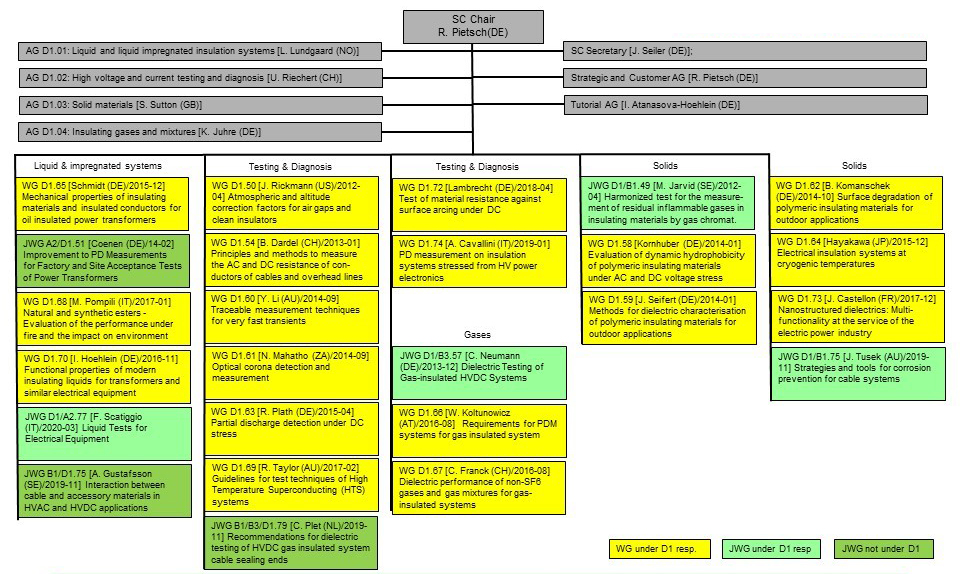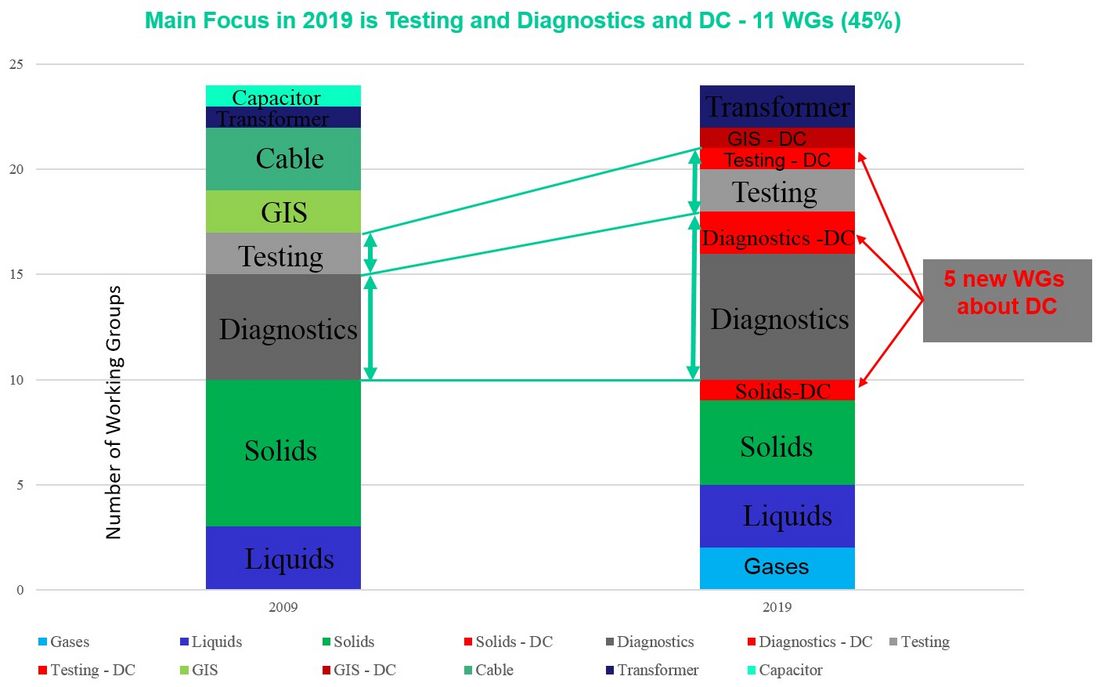Materials and emerging test techniques
by Ralf Pietsch, Chair, and Johannes Seiler, Secretary
Scope, organisation and membership
The scope of Study Committee D1 has not changed within the last years. It covers new and existing materials for electrotechnology, diagnostic techniques and related knowledge rules, and emerging test techniques which may be expected to have a significant impact on power systems in the medium to long term. As a horizontal Study Committee, SC D1 strives to support the other CIGRE Study Committees and external customers as well. The mission of the Study Committee is to facilitate and promote the progress of engineering and the international exchange of information and knowledge. It achieves this through the synthesis of state-of-the-art practices and developing recommendations, as well as identifying, investigating and monitoring the use of new or novel materials, test techniques and generic concepts for diagnosis.
Test and measurement procedures are developed using knowledge of the performance of materials and electrical insulating systems (EIS) with regard to electrical, thermal, mechanical, chemical and environmental stresses. These can then be applied to the development of new diagnostic and analytical methods for asset management of electrical apparatus to aid the work of equipment, subsystem and system committees.
The current membership of the SC consists of 23 regular members, 6 additional regular members and 12 observer members. 3 new WGs has been approved by the TC Chairman during the last year and 1 WG has been disbanded, thus SC D1 counts presently 25 WGs, including 4 Joint WGs with SC B1, one JWG with B3 and 2 JWG with SC A2. In total, about 450 expert members from 39 countries are active in SC D1 working bodies. In addition, one new Advisory Group, Insulating gases and mixtures has been put into place. The activities can be grouped in four areas, namely “Insulating gases”, “Liquid and liquid impregnated insulation systems”, “Solid materials” and “High voltage and high current testing and diagnosis”. The major activities in the various areas covered by D1 WGs are shown in Figure 1 and details are given below.

Figure 1 - Organisation chart of SC D1 at the end on November 2020
Materials
SC D1 deals with materials for electrotechnology which covers a wide variety of conducting and insulating materials including novel materials such as superconductors and nanocomposites. The majority of materials considered are insulating materials and the focus is on material characteristics and performance.
In practical applications, insulating materials are used in structures containing one or more electrical insulating materials together with associated conducting parts employed in an electrical device, thus forming an electrical insulating system (EIS). The life of an EIS is frequently determined by the life of electrical equipment under electrical, thermal, mechanical and environmental stresses, acting either individually or in combination (IEC 60505). SC D1 deals with the associated ageing processes which affect materials, which are used in generation, transmission and distribution of electric energy, and not only covers the materials but also interfacial phenomena.
Insulating gases
Based on the phenomena in electrical gas-insulated systems under DC and transient voltage stress and taking into account the properties of the involved materials JWG D1/B3.57 is investigating appropriate testing strategies for gas-insulated HVDC systems. WG D1.66 is dealing with requirements for partial discharge monitoring systems for gas insulating systems and WG D1.67 focuses on the dielectric performance of non-SF6 gases and gas mixtures for gas-insulated systems.
Liquid and liquid impregnated insulation systems
The work focussed on basic phenomena and mechanisms of conductivity, dielectric performance, dielectric strength and ageing of relevant materials and insulating systems, covering traditional insulating fluids as well as biodegradable fluids. The work aims to discover and understand the basic physical and chemical mechanisms associated with ageing, thus forming the basis for diagnostics and asset management of products like transformers and liquid impregnated cables. JWG A2/D1.51 strives to develop improvements to partial discharge measurements for factory and site acceptance tests of power transformers by measuring high electromagnetic waves with the ultra-high frequency (UHF) method. WG D1.68 is dealing with natural synthetic esters – evaluation of the performance under fire and the impact on environment and WG D1.70 is studying functional properties of modern insulating liquids for transformers and similar electrical equipment. Two new JWGs have been established this year. JWG D1/A2.77 is dealing with liquid tests for electrical equipment and JWG B1/D1.75 is investigating the interaction between cable and accessory materials in HVAC and HVDC applications.
Solid materials
In the field of solid materials, the current focus is on polymeric insulating materials. In view of the lack of a standardised test to evaluate the residual content of methane and other flammable gases evolved as by-products during the crosslinking process of XLPE insulation, JWG D1/B1.49 is developing a harmonised test procedure for the measurement of residual flammable gases in insulating materials. WG D1.56 has finished its work and the according CIGRE TB 794 has been published. WG D1.58 studies suitable test procedures for the evaluation of dynamic hydrophobicity of polymeric insulating materials under AC and DC voltage stress. WG D1.59 studies methods for dielectric characterisation of polymeric insulating materials for outdoor application with the aim to elaborate guidelines for performing precise and repeatable measurements of dielectric properties. The experts of WG D1.62 are dedicated to explore the root cause and mechanisms of surface degradation in polymeric materials for outdoor use, and to derive potential countermeasures for various material groups. WG D1.64 was established to explore electrical insulation systems at cryogenic temperatures. WG D1.73 is dealing with the multi-functionality of nanostructured dielectrics. JWG D1/B1.75 is dealing with strategies and tools for corrosion prevention for cable systems.

CIGRE active Working Groups / Call for experts
High voltage and high current testing and diagnosis
In general, methods of testing and related techniques of measurement can be very different depending on the test object, the purpose of testing and on the conditions of testing. For example, the object of the test can be the materials, insulating systems, equipment, subsystems and systems; the purpose of testing can be to determine characteristic properties of the test object, such as electrical, thermal, mechanical and chemical properties as well as ageing performance under various stresses. Further, the purpose can be for design, type, sample or a routine test of the equipment. The test can also be performed on-site or off-site as well as under on-line or off-line conditions. Testing always goes along with the requirement to measure the stresses as well as the response of the device under test in order to analyse the test result and to evaluate the performance of the test object. Lastly, testing can be used to collect information which form a basis for diagnosis, e.g. to evaluate the condition of a test object. The development of test techniques is driven by various factors, like the introduction of new materials or electrical insulating systems (e.g. polymeric materials, nanocomposites), new requirements on accuracy (e.g. more precise correction factors) or on higher stress levels (i.e. UHVAC, UHVDC) or new test objects (e.g. testing of artificially or naturally polluted insulators). SC D1 studies and synthesises state-of-the-art techniques of testing and measurement, develops relevant recommendations and new diagnostic and analysis methods for asset management, all in close cooperation with its customers.
According to a request from IEC TC 42 the WG D1.50 has been established, dealing with atmospheric and altitude correction factors for air gaps and clean insulators. After having checked and evaluated the existing correction factors for installations up to 6.000 m above sea level round robin tests will be performed by the members of the WG. Finally, guidance shall be given on modifications of the atmospheric and altitude correction factors. WG D1.54 studies basic principles and practical methods to measure the AC and DC resistance of conductors of power cables and overhead lines. The aim is to define a test procedure including suitable equipment for the measurement of AC and DC resistance taking into account the major factors of influence, e.g. frequency of current, current density and conductor temperature. WG D1.60 has been established to coordinate the development of suitable hardware and software for traceable measurement techniques for very fast transients, e.g. very fast transient overvoltages (VFTO), in order widen the basis for reference measurement capabilities meeting the relevant calibration requirements. WG D1.61 accepted the challenge to develop objective methods and indicators which can be used for optical corona measurements on overhead lines and equipment, preferably by performing comparative measurements on different sites and laboratories and by application of different types of cameras. To support the development of existing IEC standards, WG D1.63 studies methods of partial discharge detection under DC stress and the analysis of partial discharge activity with respect to pulse patterns and the sequence of pulses under various factors of influence, e.g. slope of voltage change, voltage magnitude, and material properties of the test object. The response of measuring instruments and possibilities of noise suppression will be addressed. Newly approved WG D1.69 is dealing with guidelines for test techniques of High Temperature Superconducting (HTS) systems. WG D1.72 is dealing with test of material resistance against surface arcing under DC. WG D1.74 is investigating PD measurement on insulation systems stressed from HV power electronics and new JWG B1/B3/D1.79 is caring about recommendations for dielectric testing of HVDC gas insulated system cable sealing ends.
As a resume, one can observe that the focus of our working group activities has changed within the last 10 year. We observe a quite strong increase of topics dealing with DC. This includes discussion and defining how to test DC-GIS, investigation of PD activities under DC, surface arcing under DC, methods to measure the AC and DC resistance of conductors of cables & overhead lines and the evaluation of dynamic hydrophobicity of polymeric insulating materials under AC and DC voltage stress. Figure 2 shows the development from 2009 to 2019. Additionally the focus within SC D1 shifts to testing & diagnostics: From 7 WGs in 2009 up to 11 WGs in 2019. Finally, the number of JWG with B1 increased in 2020 again.

Figure 2 - Development of topics covered by working groups in SC D1 from 2009 to 2019
Relations to other organisations
SC D1 strives to establish and maintain good relations to internal customers, i.e. equipment and sub-system committees, as well as to external organizations, like IEC, IEEE and CIRED. The main partners within IEC are TC 2 “Rotating Machines”, TC 10 “Fluids for Electrotechnical Applications”, TC 14 “Power Transformers”, TC 36 “Insulators”, TC 42 “High-voltage and high-current test techniques”, TC 90 “Superconductivity”, TC 99 “Insulation co-ordination and system engineering” and TC 112 “Evaluation and Qualification of Electrical Insulating Materials and Systems“. SC D1 also has a good relationship with the relevant IEEE organisations. With some technical committees of these organisations, SC D1 has established formal liaisons.
Tutorials and Workshops
SC D1 has established a set of tutorials covering specific topics in its field of activity. A list of tutorials (25 at present) is available on CIGRE KMS system. This year the following tutorials and workshops were held or are planned for the next months:
- Tutorial “Mechanical properties of insulation materials and conductors for power transformers”, Lars Schmidt, CIGRE e-Session 2020, 27th August 2020
- Tutorial “High-Voltage On-Site Testing with Partial Discharge Measurement”, Ralf Pietsch, Online CIGRE Colloquium India, October 23rd 2020
- Tutorial “Guidelines for altitude correction of pollution performance of insulators”, Igor Gutman, Online CIGRE Colloquium India, November 3rd, 2020
- Tutorial “Application guide for PD detection in GIS using UHF or acoustic methods”, Uwe Schichler, Online CIGRE Colloquium India, December 2nd, 2020
- Tutorial “Methods for dielectric characterization of polymeric insulation materials for outdoor applications”, Jens Seifert, Online CIGRE Colloquium India, December 12th, 2020
Publications
Is it planned to finalize and publish the results of four additional WGs within the next 5 months. Among them is the JWG D1/B3.57 with Claus Neumann as Convenor and WG D1.59 with Jens Seiffert as Convenor.
Furthermore, SC D1, among the other 15 Study Committees, contributed a chapter for the very unique Green Book, “Electricity Supply Systems of the Future“, published in August 2020.
Claus Neumann, Convenor of JWG D1/B3.57 wrote a short contribution for the 4th newsletter “Future Connections” with the title “Dielectric Testing of HVDC gas-insulated systems - Fundamentals for a future standard”.
In ELECTRA N°312 – October 2020, a Reference Paper was published under SC A2 and SC D1 with its title “Changes of new unused insulating kraft paper properties during drying - Impact on degree of polymerization”.
Meetings and Events
This year SC D1 participated at the special Session 2020, called CIGRE e-Session with the Group Discussion Meeting (2.9. and 3.9) and a Tutorial. This year the CIGRE Technical Council Award was granted to Claus Neumann (DE) for his expertise and outstanding contribution to the CIGRE community.
Finally, the Chairman and the Secretary of SC D1 like to express their sincere thanks to all authors for their contributions and presentations.
Without the strong support, hard work and good preparation by the Special Reporters Lars Lundgaard (NE) and Simon Sutton (GB), this fruitful GDM meeting would not be possible. To prepare and run this special GDM with live Q&A, Karsten Juhre (DE) and Joe Tusek (AU) support us as moderators. As a team we were able to realize this smooth running, interesting and well-organized Group Discussion Meeting.
On September 4th, 2020, SC D1 held its annual meeting (in conjunction with this CIGRE e-Session 2020) as GoToMeeting. The Chairman likes to mention the very high participation rate, as the SC D1 members were and are spread all over the whole world, from North to South America, via Europe, Asia to Australia.
Our next annual SC D1 meeting is planned for August 25, 2021, in Paris.
